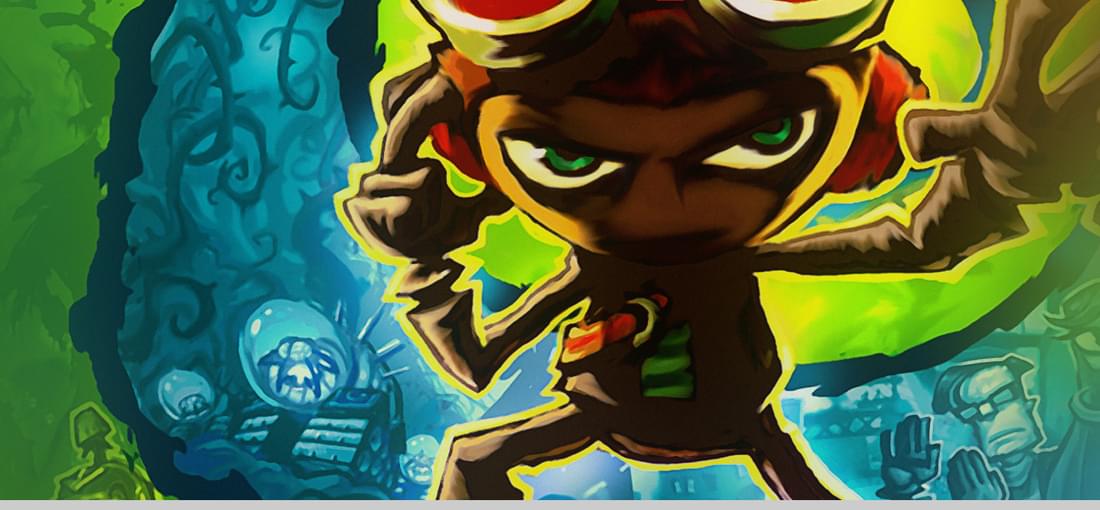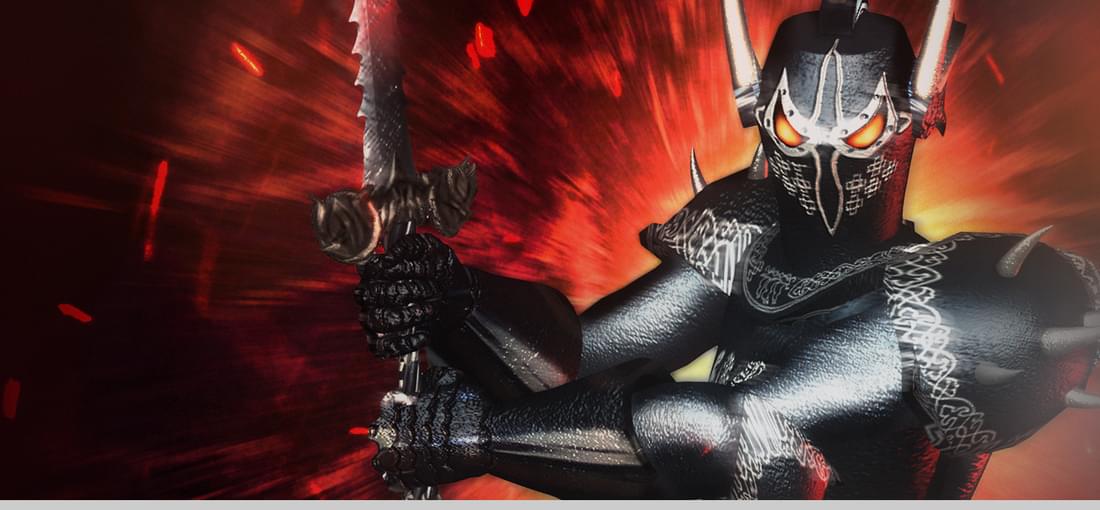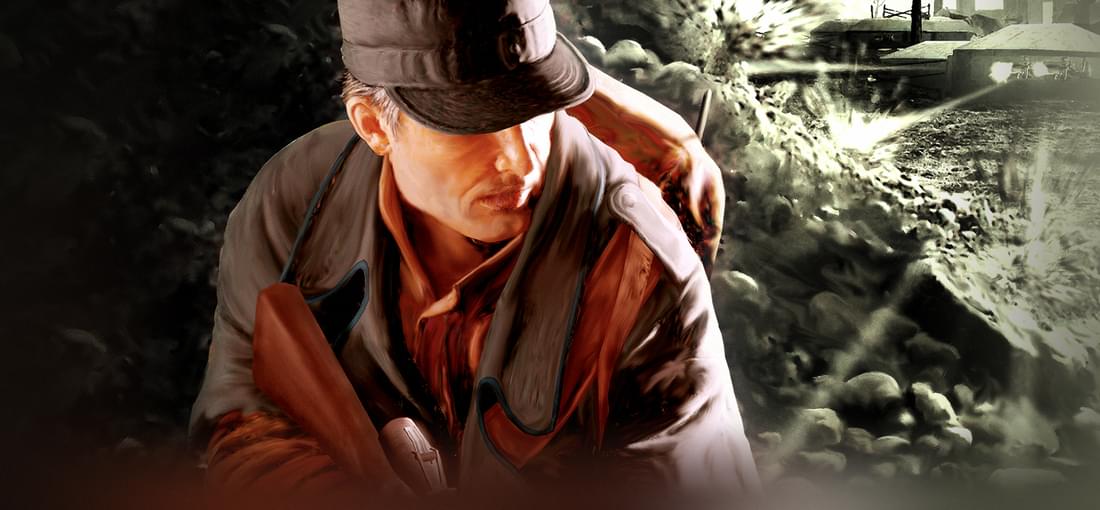


One of the best titles nobody ever heard of, Psychonauts is a fun, creative adventure game with an interesting twist, most of the action happens inside your head. Well, inside the heads of the games various wacky characters actually, as you go in to fight their various psychosis, neuroses and mental demons. You play a young cadet named Raz, who escapes FROM the circus to become a Psychonaut, a kind of psychic spy. Over the course of the game you uncover a sinister plot to steal brains, and go through numerous extremely fun levels. There are also numerous unlocks and hidden items which encourage you to retrace your steps throughout the process. The game has a gentle learning curve, guiding you through your hero's mental powers one by one, right up until the end that is. The last level of the game is an incredibly frustrating mess that replaces creativity with precision jumping puzzles, the absolute bane of third person action/adventure titles. It was the last level that caused me to put this game down and never pick it up again, as it didn't just feel cheap, it felt like a betrayal after so much excellent content. However, despite its flaws, you still should play Psychonauts, if only to see what you missed out on the first time around. There just aren't enough creative, colorful and most of all witty titles like this around.

Divine Divinity has a lot of things going right for it. It takes Diablo's simplicity and pairs it with the depth of Neverwinter Nights for a fun, easy to pick up top down RPG. You start by picking a character, although which you pick is largely a formality as you can customize them anyway you want. Spell slinging warrior, axe wielding barbarian/thief, you can do it all. You're thrown into a story that slowly unfolds around you. It's the usual stuff, land in peril from ancient evil you're the only one that can stop it, and there's a ton of baddies in the way for you to cut down with blade, bow or well rendered spell abilities. It's backed up by well rendered enemies, that seemed to me to be reminiscent of Fallout 2, and a very nice ambient score. What keeps me from giving this game a full five stars however, is the bugs -aggravating, game killing bugs. The game crashes, a lot. Sometimes it will crash while saving, which is a huge kick in the teeth if you haven't saved in a while. Characters will sometimes go into what I call a spin cycle, where the turn rapidly in place, unable to talk or interact with anything around them. If this happens during an in-game cutscene, all you can do is quit and start over. This for me, means that certain areas of the game are no go zones because they're certain to end the play experience. The game is especially bad with certain anti-virus programs, which result in corrupted save-games. For all this however, you still have at the core a really fun little title that does a lot of things right. I recommend it, just be prepared for some frustrating stoppages in an otherwise engrossing experience.
Ground Control was a fantastic game, Ground Control 2 is an OK game, but it tries to improve on the mechanics of the original and falls far short. By adding several unnecessary bits, and tinkering with the mechanics, Ground Control takes what should be a fun and exciting game and turns it into a often frustrating experience. GC2 moves well away from the original in plot, a few centuries in fact, to a new war with new characters. There are a lot of significant improvements. The graphics are better for one, and it especially shows in the ruined cityscapes you often fight in. Also, there is a cover mechanic that allows soldiers to make use of bunkers, and make better use of high ground than in the original. Soldiers can now make use of forested areas to move without having to fear from vehicle attacks, and turrets play a big factor in defending areas. However, there are a few niggling details that really strip GC2 of the frenetic fun that the original had. For one thing, the game adds capture points and landing zones, requiring you to ferry down reinforcements and micromanage in a way the original did not. This reduces the value of your men, and turns some of the levels into frustrating chases around the map as you try to track that one enemy unit that's capturing your rear capture points. Some levels are utterly stripped of strategy, turning into a grinding battle of attrition as you throw troops against enemy landing zones, hoping to catch them between dropship landings. The game has command points needed to summon units and use special attacks, which makes it hard to recapture the momentum once its lost. The most frustrating aspect of all though is the controls. Unlike the original game, which had light, responsive and intuitive controls, GC2's handling is sluggish and occasionally unresponsive. You'll find yourself clicking units again and again to get them to respond, or to get them to switch weapon modes. Add to this the fact that GC2 loses all of the original kit customization of the original, which largely strips any form of pre-mission planning or strategizing and you end up much closer to just another bland RTS game. I highly recommend you play the original, and if you're willing to put up with the frustration give this one a try, but it shouldn't surprise anyone that this was the last of the series.
I missed this game the first time around, and I'm glad GOG has given me a chance to correct that mistake. Ground Control is a fantastic RTS that is fun, action packed and deceptively complex. In many ways it reminds me of Lucas' Arts abortion of a game Star Wars: Force Commander. However, Ground Control gets everything right. There's no mineral collection, or action points, or base management whatsoever, so if you consider RTS gameplay to be frantically climbing a tech tree as quickly as possible, you'll likely be disappointed. Instead you're dropped into the action with a small force of highly specialized soldiers. The game requires you to use the specializations of those troops, the contours of the land, and your own creativity to beat back overwhelming enemy resistance. In Ground Control, you get a selection of troops which you can customize. Do you want to go quick, mobile and hard hitting? You can do that. Do you want to go with heavy ground pounders supported by artillery? No problem. Do you want heavy air support? Add it. You're only limited to which troops you start with and the room you have on your drop ships. Each unit also has a selection of special abilities that are absolutely vital to success. Each unit is strong against specific other types of units, and weak against others, requiring you to carefully manage your forces on the ground. Each mission is varied, requiring you to simultaneously complete objectives and safeguard your own troops from harm. This forces you to be invested in your units. They aren't just little bits of cannon fodder that can be easily replaced, they are vital chess pieces in your overall strategy. It's easy to pick up and play, with a helpful tutorial, so no frustrating learning curve to overcome. If like me, you missed this great title the first time around I recommend you give it a god You'll be gleefully marching past the wreckage of your enemies in no time.

Iron Storm is a game where, you often have to wonder what the designers were thinking. Presumably this game was made by people who like and play games. Presumably it was beta tested. So how can you account for the mess that is the gameplay? Why for instance, would you take a perfectly serviceable and novel premise: a world in which the Great War has gone on for decades, and simply turn it into another cookie cutter run-and-gun shooter? Why would you have stealth sections, and yet give the AI perfect aim and vision for hundreds of yards? Why allow your character to carry an absurd array of weapons and yet have to choose between an assault rifle and a rocket launcher? Why bother having a shotgun that is so ridiculously underpowered compared to everything else? This game came out post-Halflife, they should have known what they were doing. Instead you have a boring, frustrating mess of a game that is neither pretty, nor compelling in any way. What's more, there are hundreds of niggling little details that crop up constantly to annoy you. Why, for instance, when I select a weapon, should I then have to then click fire to pull it out? Why is the weapons menu so utterly counter-intuitive compared to every other shooter out there? Why can I not select weapons while using a scope, yet still run, reload and fire with it? The game is simply put, poorly designed and annoyingly linear. The gameplay itself is also deeply flawed. You're alone in hostile territory much of the time, and when you aren't, you might as well be given the abject stupidity of your AI companions. Which would be fine in any other game, except for the fact that even on easy mode you'll be instantly killed a dozen different ways. You'll soon get tired of being ripped apart by snipers, that once again can spot you from a hundred yards, and always have nigh perfect aim. Leaving you only moments to spot them before your health is once again stripped away. Killing all the enemies simply becomes an exercise in repeated quick loading since the stealth mechanic is useless. Kill one enemy, no matter how isolated, no matter how silenced your weapon, and alarms start blaring. It's made even worse by having the potential for a good story which is never developed. You might as well be fighting any war in any world for all the good the carefully contrived plot and setting do. The trenches serve no purpose other than to funnel your character from one place to another, allowing the game designers to skip pesky things like terrain detail in favor of ugly brown tunnels. It's a cheap, lazy product from start to finish, and what it's doing on a website called Good Old Games, is a mystery.
Rainbow Six is far more a tactical game than your standard FPS. The emphasis is on careful planning before the mission rather, and if you simple charge in guns blazing, either you, or a lot of hostages are going to die. It's much more a game based on intelligence, stealth and timing. Each mission presents you with a complete layout of a given area. You select soldiers based on their skill-sets, select from a wide array of weapons and then plan your egress. The map takes a bit of getting used to, but once you get the hang of it, you can plan a complicated series of actions that will have your team liquidating terrorists, flashbanging rooms and disarming bombs. The AI of your soldiers is sometimes a bit iffy. While they will often spot targets and take them out, often saving your life in the process, they tend, on occasion to get stuck in doors, but you do have a wide array of commands you can give them that they tend to execute well. The enemies, like-wise, have some AI issues. They have nigh perfect aim from any distance, so you'll find yourself trying again and again on a certain areas, but will sometimes just stand ramrod stiff while you and your team wipe them out. For those whose experience with the FPS genre begins and ends with games like HALO and Duke Nukem, you'll be in for a very steep learning curve. But once you get it down, Rainbow Six is a tense gameplay experience with a rewarding plot and lots of fun and realistic scenarios.